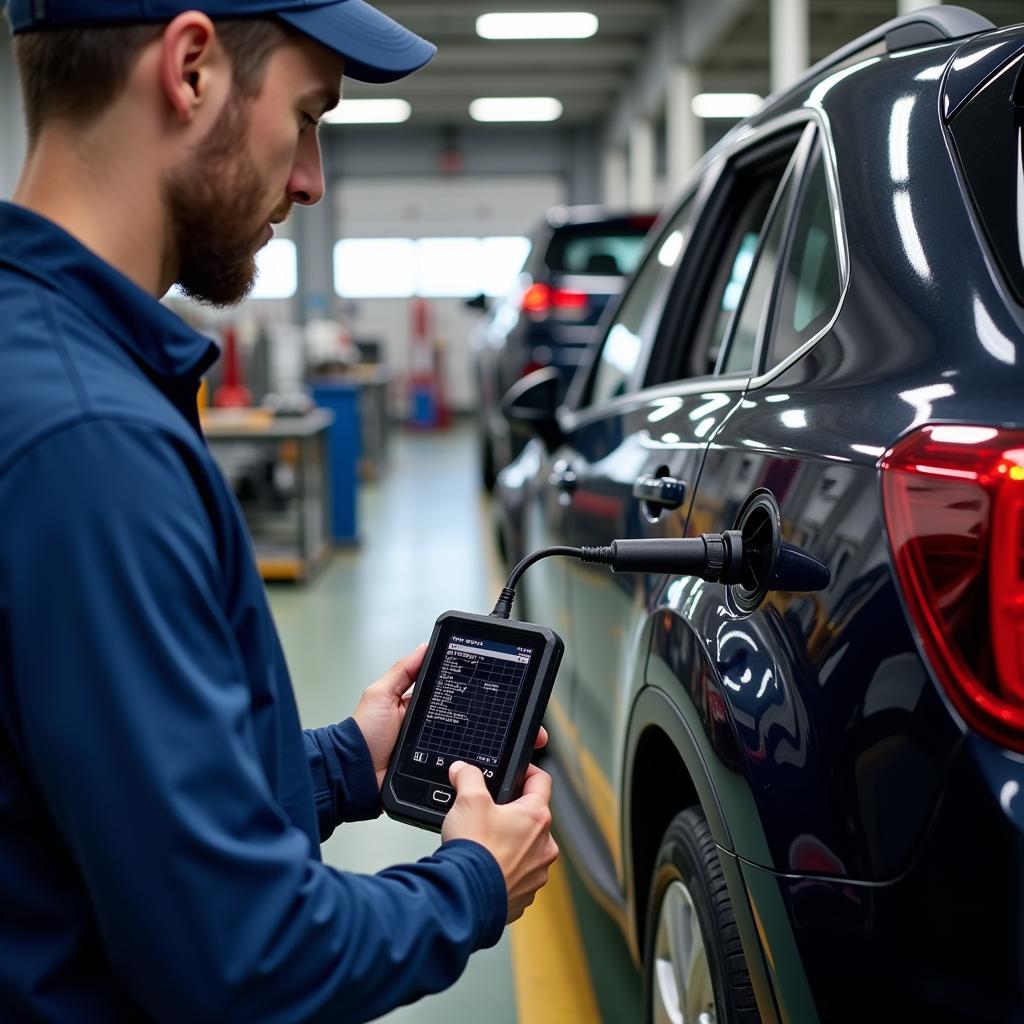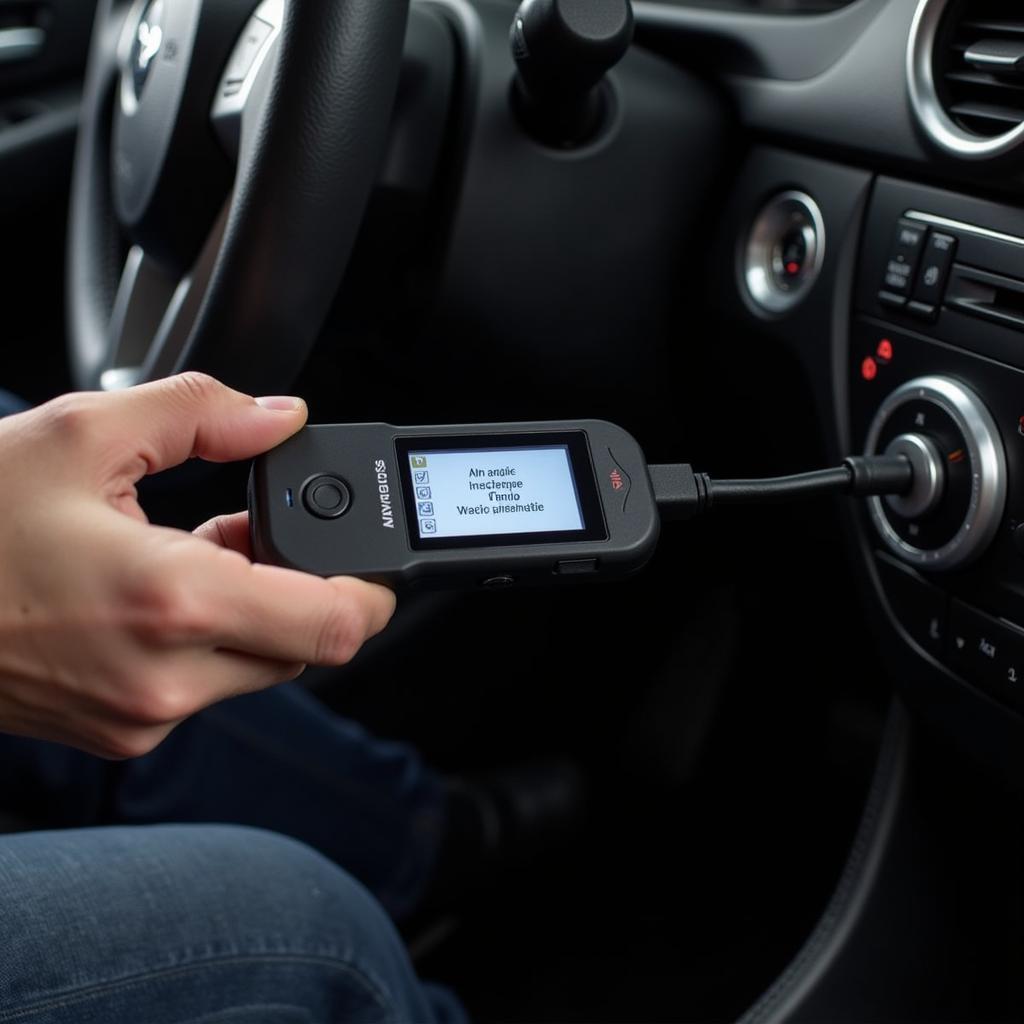Finding the right car diagnostic tool can feel like navigating a maze, especially with countless options flooding the market. Whether you’re a seasoned mechanic or a car enthusiast looking to understand your vehicle better, a reliable car diagnostic tool is essential. But with so many acronyms, features, and price points, where do you even begin? This guide will break down everything you need to know about car diagnostic tools, helping you make an informed decision based on your individual needs.
Understanding the Importance of Car Diagnostic Tools
Gone are the days of relying solely on a mechanic’s intuition to diagnose car troubles. Today’s vehicles are complex machines with intricate electronic systems. A car diagnostic tool acts as your window into these systems, providing valuable data and insights into your car’s health.
 Mechanic using a modern car diagnostic tool
Mechanic using a modern car diagnostic tool
These tools range from basic code readers to professional-grade scanners, each offering different levels of functionality. Understanding your specific needs, whether it’s reading and clearing basic engine codes or delving into advanced system diagnostics, is crucial in selecting the right tool.
Types of Car Diagnostic Tools
The market offers a wide array of car diagnostic tools, each tailored to different user groups and their specific needs.
1. OBD2 Code Readers:
These are the most basic and affordable diagnostic tools, ideal for DIY enthusiasts. They plug into the vehicle’s OBD2 port and can read and clear basic engine-related trouble codes.
 OBD2 code reader connected to a car’s OBD2 port
OBD2 code reader connected to a car’s OBD2 port
2. Advanced OBD2 Scanners:
A step up from basic code readers, these offer more in-depth diagnostic capabilities. They can access multiple vehicle systems, such as ABS, airbags, and transmission, providing live data streams and advanced diagnostic functions.
3. Professional-Grade Scan Tools:
Used by professional mechanics, these tools offer the most comprehensive diagnostic capabilities. They cover a wide range of vehicle makes and models, provide access to manufacturer-specific codes, and offer advanced programming and coding functions.
“Investing in a quality diagnostic tool is essential for any serious mechanic,” says John Miller, a veteran automotive technician with over 20 years of experience. “It not only saves time but also allows for more accurate diagnoses, leading to effective repairs.”
Key Features to Consider
Choosing the right car diagnostic tool requires understanding the key features that differentiate them.
1. Vehicle Coverage:
Ensure the tool supports your vehicle’s make, model, and year. Some tools specialize in certain makes, while others offer broader coverage.
2. System Coverage:
Determine which vehicle systems you need to diagnose. Some tools focus on engine diagnostics, while others offer access to multiple systems like ABS, airbags, and transmission.
3. Live Data Streaming:
This feature allows you to view real-time data from various sensors, providing valuable insights into your vehicle’s performance.
4. Bi-Directional Control:
Advanced tools offer bi-directional control, enabling you to interact with vehicle systems for component testing and troubleshooting.
5. Software Updates:
Regular software updates are crucial to ensure compatibility with newer vehicle models and access to the latest features and bug fixes.
Choosing the Right Tool for Your Needs
Selecting the ideal car diagnostic tool depends on your specific needs and budget.
For DIY enthusiasts and car owners: An OBD2 code reader & scan tools car engine diagnostic scanner or a basic OBD2 scanner might suffice for basic diagnostics and maintenance.
For experienced DIYers and aspiring mechanics: Consider an advanced OBD2 scanner with multi-system coverage and live data streaming capabilities, like the Autel MaxiCOM MK808 OBD2 Reader Car Diagnostic Scan Tool.
For professional mechanics and workshops: A professional-grade scan tool with comprehensive vehicle and system coverage, advanced programming functions, and regular software updates is essential.
“Understanding your diagnostic needs is key to choosing the right tool,” advises Miller. “Start with the basics and gradually upgrade as your skills and requirements evolve.”
Conclusion
Investing in the right car diagnostic tool empowers you to take control of your vehicle’s maintenance and repairs. By understanding your needs and the key features to consider, you can make an informed decision that fits your budget and empowers you to keep your car running smoothly.
Remember, a reliable car diagnostic tool is not just a gadget; it’s an investment in your peace of mind and the longevity of your vehicle.

Leave a Reply